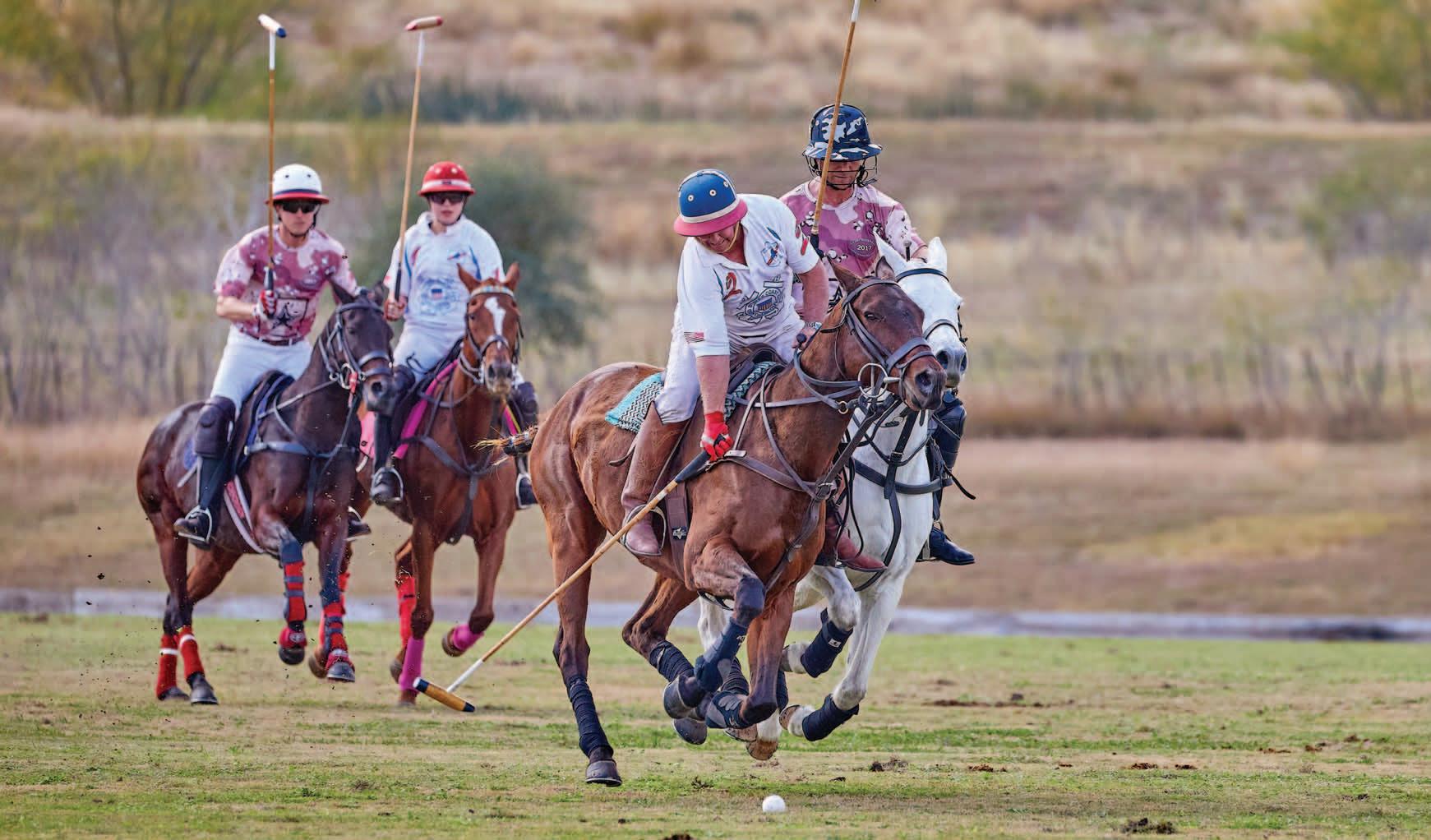
30 minute read
Polo Report
DISPATCHES FROM THE WORLD OF POLO
S OUTHWEST
COAST GUARD WINS TEDDY ROOSEVELT
MURRELL DAVID
David Crea holds steady while under pressure from Phillip Kampshoff. Chris Ballard and Minerva Lemesoff follow behind in the final of the Teddy Roosevelt tournament at Two Wishes Ranch.
THE CENTRAL TEXAS Polo Association hosted the USPA Teddy Roosevelt tournament Nov. 21-22 at its Two Wishes Ranch in Lockhart, Texas. The tournament, played annually since 2013, is the oldest named USPA military tournament. Initially played in the arena, it transitioned to outdoors about five years ago when it was played at the Houston Polo Club. The timing of the event in mid-November generally draws about six teams and this time was no exception.
USPA military tournaments require one player on each team to have a tie to the military. Due to the on-going pandemic, the tournament qualified for the USPA incentive program, which provides a professional umpire, prize money and trophy reimbursement.
This year, the teams represented the Navy, Marine Corps, two Army teams, Air Force and Coast Guard. Players came from Dallas, San Antonio, Austin and Houston areas to participate.
The first round was played as two round robins. Coast Guard (Minerva Lemesoff, David Crea, Tom Crea, Jack Crea) edged Navy (Joss Leufrancois, Mike Lancaster, Nadir Khan, Zoe Lehmer), 3-2½, in round one of the first game. Marine Corps (Kitana StCyr, Ariel Mancebo, Lance Stefanakis, Carlos Ramirez) doubled up Navy, 31½, before falling to Coast Guard, 4-1.
In the next game, Air Force (Ismael Vazquez, Jessica Mignone, Javier
MURRELL DAVID
Coast Guard’s Tom Crea, David Crea, Minerva Lemesoff and Jack Crea won the Teddy Roosevelt. With them, center, is Karl Hilberg. Navy Red’s Javier Insua, Zoe Lehmer and Jose Velez receive their Nimitz trophies from Karl Hilberg.

Navy Red’s Zoe Lehmer leads the pack in the rain during the Chester Nimitz Cup final.
MURRELL DAVID
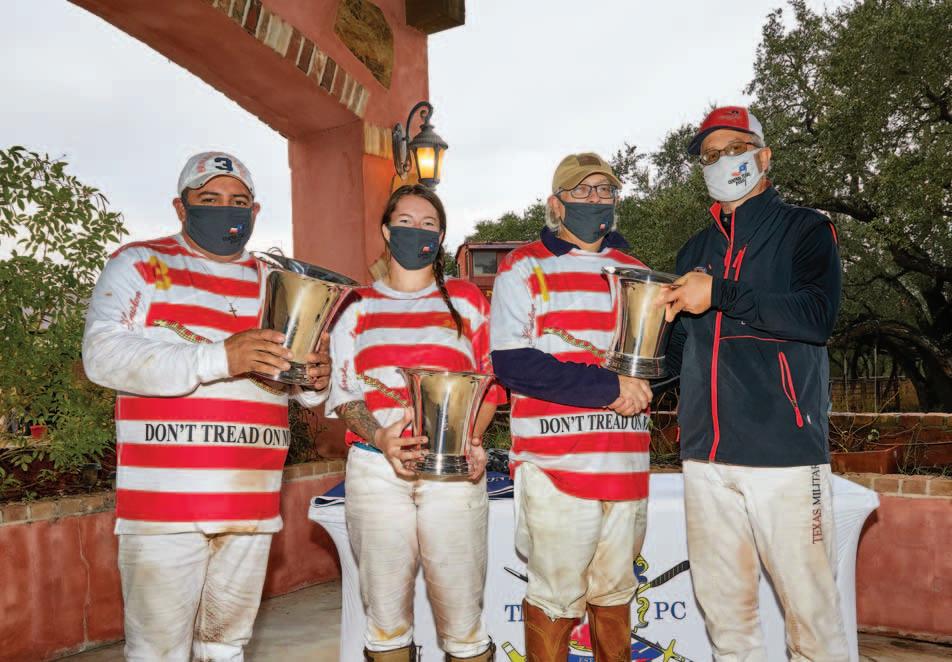
Insua, Ariel Rodriguez) topped Army Black (Jose Velez, Carter Heltzen, Wyatt Myr, Dave Barrons), 2½-2. Army Tan (Chris Ballard, Sylvia Kampshoff, Gal Shweiki, Philipp Kampshoff) also edged Army Black by a half goal, 3½3, and Air Force, 1½-1.
Army Tan and Coast Guard, both that went undefeated, would meet in the final. But first, two consolation matches were played in a continuous format. The first consolation was played as chukkers 1, 3, 5 and 7, while the second consolation played chukkers 2, 4, 6 and 8. The action heated up with Marine Corps scoring three goals in the first half and five the second to defeat Air Force, 8-5½. In the other consolation, Army Black dominated Navy, 6-1½.
In the championship match, Army Tan got off to a great start with Philipp Kampshoff converting a Penalty 2 before his wife, Sylvia Kampshoff took the ball the length of the field to score. Tom Crea put Coast Guard on the board with a Penalty 3 at the end of the chukker. The three Crea brothers combined for four goals in the next two chukkers while holding Army Tan scoreless. The husband and wife Kampshoffs finished off the game with a pair of goals to close the gap, but Tom Crea’s field goal ensured Coast Guard the win, 6-4½.
Tom Crea was named MVP; David Crea took home the Sportsmanship Award; and Sylvia Kampshoff’s Pandemia was Best Playing Pony.
MURRELL DAVID

MURRELL DAVID

Karl Hilberg congratulates Navy’s MVP Ariel Mancebo, Lance Stefanakis, Kitana St-Cyr, Zoe Lehmer and Ekaterina Kotova.
Jack Crea’s Rubia was Best Playing Pony in the Gen. George S. Patton Jr tournament final at Two Wishes Ranch.
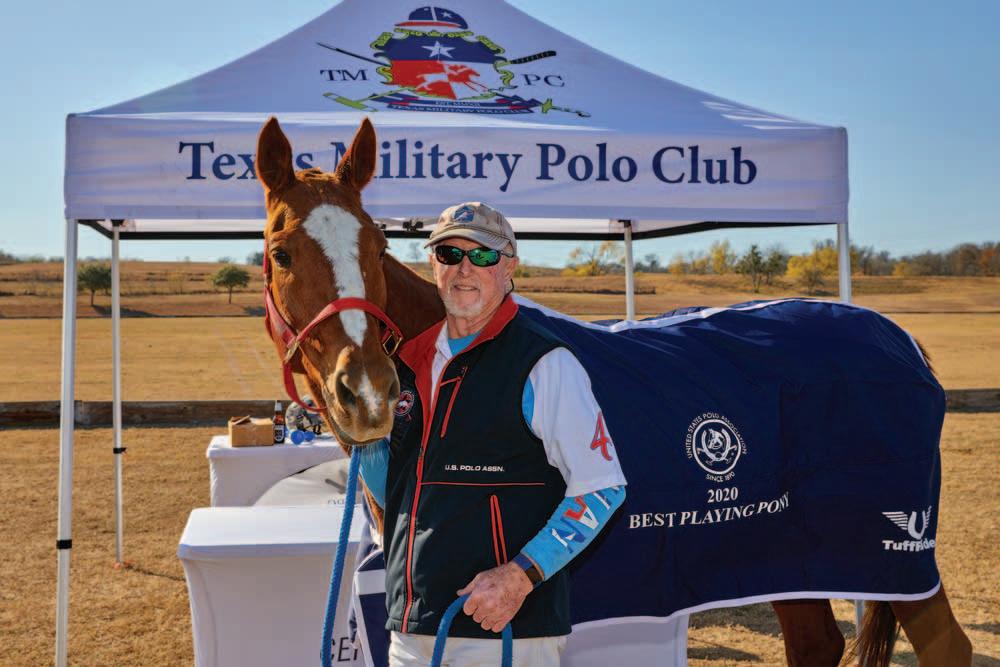
Action continued on Dec. 5 when the CTPA and Texas Military Polo Club held the USPA Adm. Chester W. Nimitz tournament in remembrance of Pearl Harbor.
The memorial match was played in the arena on a rainy day. Navy Red (Jose Velez, Zoe Lehmer, Javier Insua) began with a one-goal handicap and blew out Navy Blue (Dani Gibson, Tres De La Paz, Nadir Khan), 4-1, in the first seven minutes to lead, 5-1. Blue, led by Khan, turned the tables in the second, outscoring Red, 4-1, leaving just the handicap separating the two teams, 6-5. The tempo slowed down in the third as the teams focused on defense, allowing each team only a goal each to maintain the difference. Khan tied the match in the final chukker, but Insua shot back with a two-pointer, then added another for good measure to end the game with Navy Red on top, 10-7.
Back on the Two Wishes field, the USPA Gen. Patton tournament was played Dec. 12-13, also in remembrance of Pearl Harbor and all our sailors, soldiers, marines and airmen, past and present. Established in 2017, the tournament is named after Gen. George S. Patton Jr.
Four teams competed in the event. Navy (Kitana St.-Cyr/Ekaterina Kotova, Zoe Lehmer, Lance Stefanakis, Ariel Mancebo) got off to a strong start against JD Polo (Jose Velez, Mike Lancaster, Javier Insua, Taimur Zeb) in the first match. Stefanakis converted a penalty then scored from the field and Lehmer followed with a goal while JD was silent. Insua’s Penalty 2 put JD on the board in the second. Navy kept up the pressure in the second half. Stefanakis shot in back-to-back goals and Mancebo added a goal of his own. Trailing 8-1, JD Polo rallied in the final seven minutes with Insua slamming in three goals while holding Navy to one. While it was a good effort, it wasn’t enough and Navy advanced to the final with the 9-4 win. In the second match, Marine Corps (Ismael Vazques, Pat Macleod, Ariel Rodriguez, Nadir Khan) took on Coast Guard (Chris Ballard,
MURRELL DAVID Navy’s Lance Stefanakis keeps the ball from Coast Guard’s Tres De La Paz in the final of the Patton Cup.

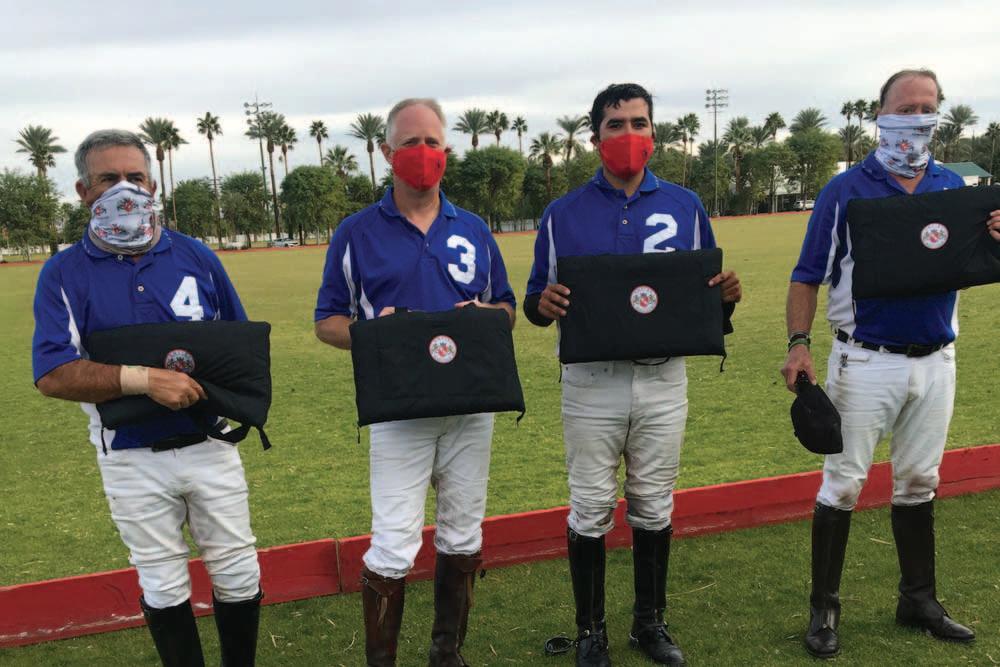
Granite Bay’s Carlos Galindo Sr., Cameron Smith, Jonathan Garnica and Eric Hammon won the 4-goal Holiday Cup at Empire Polo Club. Scottsdale’s Rhyo Rainsford, Cacho Galindo, Martin Vidal and Colby Smith won the 1-goal Holiday Cup at Empire Polo.

Tres De La Paz, Gal Shweiki, Jack Crea). Marine Corps came out of the foxhole first with Vazquez and Rodriguez splitting the uprights in the first chukker. Coast Guard shot back in the second with Shweiki and Crea scoring two each. Marines had a good chukker too, with Rodriguez and Macleod adding goals to tie the score, 4-4, at the half.
Shweiki scored two more in the third added to a goal from De La Paz to give Marine Corps the lead. Rodriguez tallied to keep the game close, 7-5. The teams battled in the final chukker with neither able to reach the goal until Crea converted a penalty to end the match with Coast Guard advancing, 8-5.
JD Polo and Marine Corps met in the consolation, with Marine Corps beginning with a handicap goal. Khan, Rodriguez and Vazquez--with a beautiful neck shot--added to it. The teams traded goals in the second. JD Polo once again rallied in the second half after trailing, 5-1. Insua slammed in three goals while Marine Corps was held to a single goal from Vasquez, his second impressive neck shot of the match. Having closed the gap to two, 6-4, JD Polo tried to hold the momentum but was unable to break through the Marine Corps’ defense. Meanwhile, the JD Polo defense also held steady. Marine Corps held on for the victory.
In the final, Navy began with a handicap goal but would it be enough to overcome the favored Coast Guard team? Crea said his concern was how Mancebo would implement Lehmer into Navy’s strategy. Crea’s words turned out to be prophetic as Mancebo and Stefanakis sent passes to Lehmer for the first two goals. Crea put Coast Guard on the board with a Penalty 3. The second chukker offered the best polo this year with both sides playing great team polo. Stefanakis tallied twice and Kotova added another while Coast Guard kept it close with two goals in reply. Mancebo’s lone goal in the third padded Navy’s lead, 7-3. Stefanakis and Crea traded goals in the final chukker, allowing Navy to hold on to its four-goal lead until the game’s end, 8-4.
Zoe Lehmer was named MVP; Ariel Mancebo was the Sportsmanship Award winner; and Jack Crea’s Rubia was Best Playing Pony.
PACIFIC C OAST
GRANITE BAY SHINES IN 4-GOAL HOLIDAY CUP
Granite Bay ended the year with a win in the 4-goal Holiday Cup at Empire Polo Club in Indio, California, Dec. 27.
Three teams played off in a roundrobin over two days, with scores carrying over from one day to the next. Granite Bay (Eric Hammon, Jonathan Garnica, Cameron Smith, Carlos Galindo) faced Hyt/Luna Polo (Hannah Taylor, Jennifer Alexy, Diego Larregli, Ernie Ezcurra) in the first round, with Granite Bay leading, 3-1. Ezcurra started the scoring on day 2, trading goals with Galindo. Ezcurra added two more in the second to Galindo’s one but it wasn’t enough and Granite Bay narrowly won, 6-5.
Hyt/Luna Polo faced Mother Chukkers (Sukey Forbes, Nick Fernandez, Alejandro Gonzales, Nicolas Maciel) in round two. This time Hyt/Luna Polo led, 4-1, after the first day. Neither team scored in the first chukker on day two and the teams negated each other in the second when Larregli swapped goals with Gonzales, ending with Hyt/Luna Polo holding onto a 5-2 advantage.
Granite Bay carried a 4-1 lead into the second day against Mother Chukkers. Granite Bay was shut out on day two, but Mother Chukkers was unable to dig out of the hole it was in, falling 4-2, while Granite Bay held on to take the title.
In the final of the 1-goal Holiday Cup played the same day, Scottsdale (Rhyo Rainsford, Colby Smith, Cacho

California Polo Club’s Chuck Stanislawski, Robert Hong, Tom Schuerman and Domingo Questel won the January 1-goal at Empire Polo. Sebastian Koga’s Mississippi was Best Playing Pony in the USPA Players Cup at New Orleans Polo Club.

Calindo, Martin Vidal) took on Sutter Buttes (Bonnie Magill, Reanne Magill, Paul Sethi, Toto Socas). Reanne Magill struck first but Galindo shot back with one of his own. Socas split the uprights in the second, but Galindo again had the answer. Sethi found the mark in the third, but Galindo tightened the screws, scoring three in a row to take a 5-3 lead. Socas cut the deficit to one early in the fourth, but Smith responded. Reanne Magill sandwiched goals around one from Smith, bringing the team within one, 7-6, but time ran out and Scottsdale had the win.
The season kicked off with the 4goal Jackalope Cup final on Dec. 20. It was a close battle between Sotheby’s (Jessica Dubin, Colby Smith, Ian Schnoebelen, Jim Wright) and Pasadena Polo (Jonathan Garnica, Ernie Darquea, Cameron Smith, Tom Schuerman). Garnica put the first goal on the board but a Penalty 3 in favor of Sotheby’s allowed Wright to level the score. Wright added a field goal to end the chukker with Sotheby’s ahead, 2-1. Garnica scored again, but Wright converted a pair of Penalty 2s, then added a field goal to increase the lead to 5-2 going into the final seven minutes. Pasadena rallied in the fourth with Smith and Garnica cutting the difference to one but the team ran out of time and Sotheby’s took the win, 5-4.
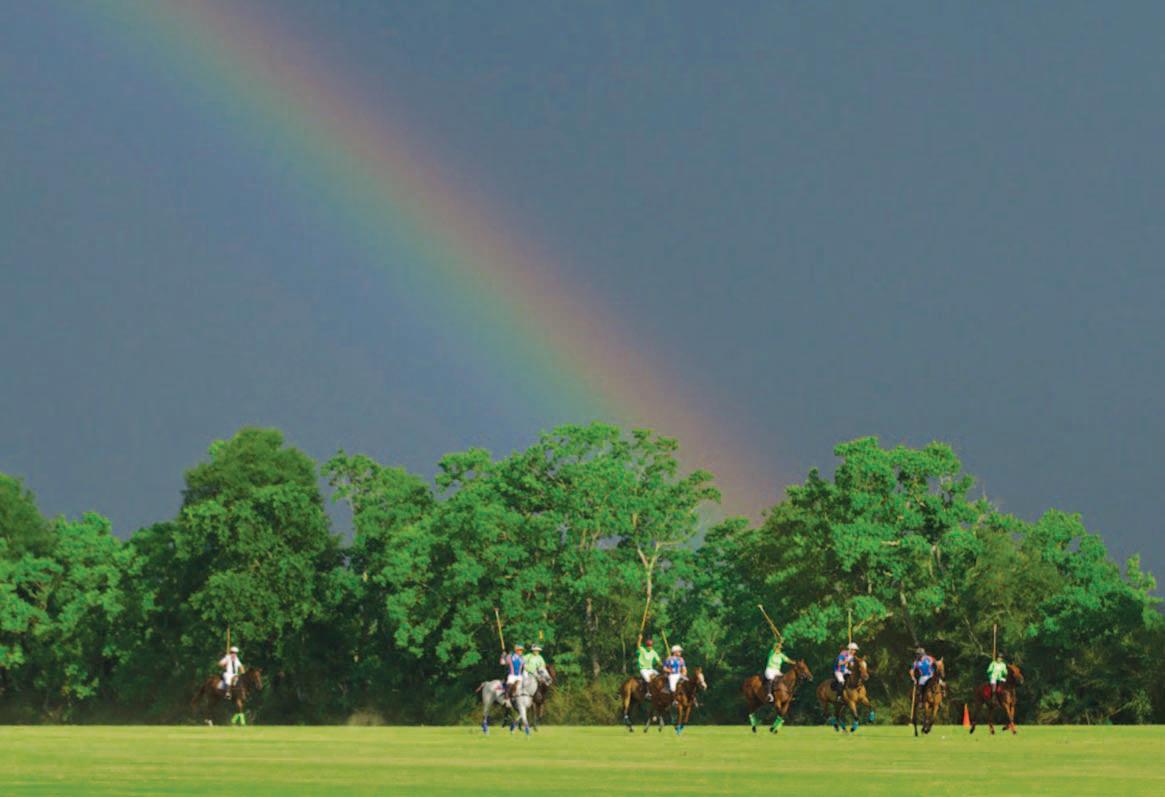
S OUTHEAST
FOLSOM PRISON LOCKS UP USPA PLAYERS CUP
The New Orleans Polo Club in Folsom, Louisiana, finished out an active tournament season despite the global pandemic. It held five USPA events beginning with the Players Cup. Four teams competed in the event for the $2,500 prize thanks to the USPA’s Covid Stimulus Relief Program.
Folsom Prison (Kasey Reeves, Lori Summers, Dave Thomas, Guillermo Usandizaga) defeated Carpathia (Buddy Terral, Reese Straughan, Sebastian Koga, Valentino Echezarreta) for the title. Guillermo Usandizaga and Dave Thomas were co-MVPs and Sebastian Koga’s Mississippi was Best Playing Pony.
Later in the season, SO Bob Polo (Kim McGrath, Reese Straughan, Marcos Alberdi, Bob Edmundson) overcame Carpathia (Buddy Terral, Eden Gonzalez, Sebastian Koga, Valentino Echezarreta) on a technicality. Carpathia was determined to be ineligible due to a rule’s violation. Marcos
The USPA Players Cup was played under a rainbow, serving as a prelude to an afternoon storm.

New Orleans Green’s Kayla Nussbaumer with the Champagne Chukkers Championship trophy after winning it. Sawyer Aviation’s Kathy Wood, Jennifer Nodwell, Vinay Bangalore and Sarah Flynn won the Skull Valley tournament’s A Flight.

Alberdi was named MVP and Valentino Echezarreta’s Tramposa was Best Playing Pony.
In the Mardi Gras Cup, Rough Riders/Garrett Estancia (Granville Semmes III, Mohamed Elkersh, Sebastian Bonorino, Inaki Echezarreta) defeated Top Gun Polo in a close match. Inaki Echezarreta was MVP and Lori Summers’ Melania was Best Playing Pony. Granville Semmes III won playing in his first ever polo tournament.
The Governors Cup, originally scheduled for the spring, was played the first weekend of November with four teams competing. The Mercedes Benz Club of Mississippi arrived with a fine display of both vintage and modern automobiles and the Junior League of Greater Covington held its Fall Social during the matches. The final saw Mercedes Benz defeat Carpathia. Elio Yanes was MVP and Suzy Beck’s Petite was Best Playing Pony.
Three teams traveled from Point Clear Polo Club to join three home teams in the Congressional Cup, Nov. 14-15. In the final, Lori Summers’ Faux Pas Polo defeated Rough Riders by a goal. Luis Ansola was MVP and Oscar Hernandez’s Princess was Best Playing Pony.
The final week of the season featured the Retro Classic seniors tournament as well as the Champagne Chukkers Championship for new players. After, players and guests enjoyed a fish fry sponsored by Jesse Wimberly. Summergrove Farm (Bill Simmons, Mohamed Elkersh, David Fennelly, Sebastian Koga) topped the Retro Classic after defeating Crystal Hot Sauce and Nola Polo. New Orleans Polo Green (Kayla Nussbaumer, Jerold Murrell, Emily Guiza, Inaki Echezarreta) defeated New Orleans Polo Black and New Orleans Polo White in the Champagne Chukkers Championship. Polo White’s Elsie Saunders was MVP.
B ORDER
SAWYER AVIATION SOARS IN SKULL VALLEY ACTION
Sawyer Aviation came away the winner in the A Flight of the 16th annual Skull Valley tournament Oct. 10 at the Van Dickson Ranch in Skull Valley, Arizona.
The first game saw Skull Valley Polo (Chelsea Groves, Kelly Goetz, Leigh Jason, Croix Waage) battle Sawyer Aviation (Jennifer Nodwell, Sarah Flynn, Kathy Wood, Vinay Bangalore). Both teams struggled to get on the board in the first half. Sawyer eventually found the mark, ending the half, 1-0. Skull Valley tied it in the third, but Sawyer knocked in three more thanks to the combined efforts of Wood and Flynn for the 4-1 win.
The B Flight game had Columbia West (Natalie Camacho, David Barnett, Martin Vidal) quickly score the first three goals before William A. Clark Construction (Leigh McDaniel, Bill Clark, Andres Camacho) put up its first goal. Columbia West led, 4-3, at the half.
Clark Construction tied the score in the third. Natalie Camacho put in two goals in the final chukker, but Andres Camacho responded with three and Bill Clark put the final nail in the coffin, 86.After the matches, Paul and Carolyn Harris opened up the barbecue and the band played on. Everyone enjoyed the Texas-style spread and the cool air to end the season.
E ASTERN
BENNY’S PREVAILS IN WOMEN’S CHALLENGE
The USPA Women’s Challenge Cup is the highlight of the Tinicum Park Polo Club (Erwinna, Pennsylvania) season, and this year was no exception. The global pandemic restricted travel and made outdoor venues more desirable. A surge of appreciative spectators, socially distanced along
VERGARA JEAN women’s tourna- with six of the team’s nine goals. ment. In B Flight, Arby Dobb (Sierra Walt, In the first game, Lisa Singer, Val Washington, Grace under the watchful Fleischman) fell to Lampire (Robyn Beleyes of umpires Den- laurdo/Carol Hails, Kylie Beard, Laura nis Santana and Willson, Rebecca Link), 3-0. Beard Juan Martinez Baez, scored all of her team’s goals. Stars Aligned The A Flight consolation saw Stars (Cheryl Arnold, Val Aligned soundly defeat Arby Dobb, 5Washington, Brooke 1½. In the final, Benny’s on the Beach Burke, Shariah Har- overcame Tinicum, 4½-3. Meg Mullin Kelly Wells with Women’s ris) took on Benny’s was named MVP and Kelly Wells’ paint Challenge Best Playing on the Beach (Holly Chalupa was Best Playing Pony. Pony Chalupa Chamberlain, Laura Willson, Ann the field, were a welcome sight to the Oniskey, Erica Lipton). The teams alterplayers. nated scores until the final chukker
Four well-rounded teams competed when Stars Aligned seemed to run out in A Flight while two teams played in B. of steam. Willson, who made all the Some players came from afar, making a goals for her team, hammered in the weekend of it to enjoy the games and final two goals to end the match, 5-3, social events. Organizer Cheryl Arnold and advanced Benny’s on the Beach to dedicated this year’s tournament to the the final. club’s longtime announcer, Carol Stahl, In the other match, Tinicum (Meg who has been battling a recurrence of Mullen, Victoria Halliday, Kathy Fowspancreatic cancer. Stahl is a remarkable er, Kelly Wells) dominated Arby Dobb woman club members fondly refer to as (Sue Spencer, Johanna Pederson, Ashthe mother of Tinicum Park Polo. Stahl ley Mackenzie, Sarah Martin), 9-4, to was on hand to announce this year’s advance to the final. Wells led Tinicum

FOLTZ REBECCA
I NTERNATIONAL
DUNDAS TRIUMPHS IN CONGRESSIONAL CUP
Six teams competed in the 8-goal USPA Congressional Cup at Costa Careyes Polo Club in Jalisco, Mexico, Dec. 27-Jan 4. The club is located on the Pacific Ocean south of the lively city of Puerto Vallarta. The club, owned by Giorgio Brignone, is now being managed by Costa Careyes Partners, led by Chris Falk and Brian
Participants in the Congressional Cup at Costa Careyes

Boyd, which leased the mature and newly-refurbished fields. The global pandemic slowed down the usual festive climate but the polo was still fast and furious. Jerseys, provided by USPA Global, went home with the players to 12 different countries after the tournament.
The tournament was played in a cross-bracket format with the winner in each bracket advancing to the final. Dundas 2 (Gary Magness, Nico Millan, Mariano Fassetta, Juan Marcos Cruz) topped Bracket 1, while Quinto Sol (Manuel Matos, Valerio Aguilar, Guillermo Jimenez, Joel Acosta) led Bracket 2.
Dundas 2 showed it meant business, holding Quinto Sol to a single goal in the first half, while amassing five goals. Quinto Sol rallied in the second half with Acosta scoring two and Matos one in the third while holding Dundas 2 to a goal and cutting the difference to two, 6-4. Dundas 2 fought back, ending the match ahead, 8-5.
Mariano Fassetta was MVP and Gary and Sarah Magness’ Bonita, played by Fassetta, was Best Playing Pony.
La Karina (Brian Boyd, Patrick Boyd, Benito Hernandez, Carlitos Gracida) took third place; Dundas 1 (Cable Magness, Jason Crowder, Tony Uretz, Domingo Aldaco) took fourth place; Cabinet Connection (Will Falk, Josh Falk, Chris Falk, Federico Uribe) was fifth; and El Careyes (Miguel Gomez de Parada, Carlos Hernandez/ Isaac Hernandez, Adam Justin) was last.
The 2-goal Annual Copa de Careyes saw four teams compete. After the Colombian Las Piratas team (Mateo Espitia, Martin Espitia, Juan Martin Cabal, Marco Cabal) and Agua AltaClub 51 (Milo Ardissone, Gian Carlo Brignone, Coco Sandhu, Luis Perez) were eliminated in the semifinals, Los Hermanos (Chrissy Falk, Katie Falk, Sydney Falk, Patrick Boyd/Ace Boyd, Benito Hernandez) met Palomir/Polo House Prive (Miguel Gomez de Parada, Mariano Gomez de Parada, Dante Munguia, Adrian Pia, Juan Chi) in the final. Los Hermanos dominated the first chukker with three goals, but Palomir/Polo House Prive answered back with two in the second. Los Hermanos kept up the pressure in the second half, ending the match ahead 8-6½. Martin Espitia was named MVP and Kiss, a lovely mare from Mexico played by Patrick Boyd, was Best Playing Pony.

O BITUARY
GEORGE RADCLIFF SR.
George W. Radcliff Sr. lost his long battle with cancer on Dec. 8, 2020. Born to Herndon and Mary Radcliff in 1941, George was a longtime resident of Mobile, Alabama.
Radcliff was one of the original members of the Point Clear Polo Club. Polo became a passion, and he went on to foster many players in the Southeast, including two sons and many nephews and cousins.
In the early days, Radcliff would say how if he had all the money, all he would do was play polo. At that time, he and friends would buy horses out of the kill pens to play on a cleared pasture. That was before he struck oil. After, Radcliff competed in polo around the country, including Sarasota, Gulfstream, Memphis, Sheridan, Aiken and Atlanta, making many close friends along the way.
Kenny Mclean wrote, “George was a man of many talents. Along with being a great father, he was a mariner, boat captain and even a one-time professional water skier at Cypress Gardens. He attended the University of Alabama on a swimming scholarship. He also owned and operated a fleet of tug boats and barges during his early years. He was responsible for bringing in oil fields in South Alabama.”
According to McLean, Radcliff was also an accomplished harmonica player and guitar crooner as well as a talented surfer.
“George loved his 55-foot Herreshoff schooner, ‘The Bounty,’ in which he sailed over many bodies of water and excelled in many regattas,” McLean added. “He was a dedicated friend who would give you his best horse to play at any time, if you needed. As his good pal Winston Groom would say of George, ‘He didn’t live no hum drum life!’”
Groom is the author of the novel “Forrest Gump” which is co-dedicated to Radcliff.
Radcliff’s daughter Fontaine Radcliff Howard wrote of her father, “He was the coolest guy I’ve ever known. He was so tough he could make you tremble with just a look, but he loved so big. He was a larger-than-life character that lived every minute of every day and at least 10 lifetimes.”
In addition to horses and polo, George loved hunting and fishing. George’s second wife, Kay, brought kids into their marriage, including Chip Campbell. Radcliff considered these kids his own and Campbell credits Radcliff for getting him into polo.
Radcliff is survived by his wife of 19 years, Karen McKenzie Radcliff; son George W. Radcliff II; daughter Fontaine Radcliff Howard; and eight grandchildren. His son and daughter both live on the family’s 2,000-acre Saraland, Alabama, ranch called Celeste as do all of his grandchildren. •

Joint injections can help some hock issues. (continued from page 17)
Other injuries may be due to a simple blunt trauma or a puncture if the horse runs into something while running around the pasture. “In older horses with hock changes we may see a narrowing of the joint due to arthritic changes. Some of this could be due to how they were used as a young horse (how much stress on the joints in an athletic career). If those early problems are not seen and addressed, there may be some cartilage weakening later on and arthritic changes later in life,” she says.
Some hock problems may be due to conformation, and how straight or angled the hind leg is, and which stresses are put on the hock joint. “Poor hoof management and shoeing can also have repercussions on up the leg. Sometimes arthritic hocks are simply due to overwork and overuse, with lots of wear and tear.”
Fortunately there are many treatments today that can help. “We have several types of therapeutic modalities that can be used if we know there are changes going on, and if there is pain in the joint. We also use a variety of biologics like IRAP, stem cells and PRP to help improve the joint environment and to manage or decrease the pain and damage. The world of biologics is constantly evolving, and we are able to continually provide more effective and successful modes of treatment,” she explains.
Sometimes with these horses it may be time to find a new less-demanding job, if the hock joints can’t stay sound in a strenuous athletic career. “Also, within the hock, some of the small bones can fuse together and sometimes this can decrease the pain the horse experiences. This is not always the case but is possible. Ideally the horse upholds its normal joint space and function,” says Rudolphi.
With some hock problems it’s wise to monitor the changes and take radiographs annually. “This can help guide management of these horses; your management will probably change over time. If you have been treating the hock condition, it may become non-responsive to that particular treatment and you may have to try something else or add a different anti-inflammatory or joint therapy,” she explains.
There are some topical approaches such as shock wave therapy or magna waves. “These can be a useful secondary therapy, as well as making sure the horse is on a good exercise and conditioning program. It is helpful to keep the hind end strong so the horse can maintain adequate functional muscle mass. If the muscles, tendons and ligaments are strong and correctly conditioned, there is less risk for damage,” she says.
Shoeing can also make a major difference. Shoeing can help or hinder a hock problem, so you want to make sure you have a good farrier who can keep the feet well balanced. “Sometimes we have to take radiographs of those feet to make sure we have them balanced in the hind end. We sometimes miss that when looking at the hind feet. If there is an imbalance or incorrect angle on the hind feet, it puts more stress on the hock joints,” Rudolphi explains. If the hind feet are not balanced, both the joint and soft tissue structures surrounding the hock will be stressed. There may be some soft tissue tears on the ligaments around the hock. These can also be due to abnormal work or strain.
Joint health is very important in the equine athlete, and many people use joint supplements to try to help protect the joints from wear-and-tear damage. “Some types of joint supplements are fed (added to the grain ration) and some are injected intravenously or intramuscularly. Horses are all a little different in terms of what they respond to, and what works best, for these complementary therapies,” she says.
Basically the things that can happen to the hock joints in a young horse are osteochondral fragments (chips) in the upper tibial tarsal joint, inflammation in any of the three joints for a variety of reasons (generally related to exercise), associated soreness of the proximal suspensory apparatus (as part of the functioning unit of the hock) and collateral ligament injuries. Some of these injuries may be due to conformation--putting more stress on certain parts of the joint. •

(continued from page 13)
and drive directly to the airport, stopping only to fill the car with gas. You change your clothes, pack your bag as best you can in the rental car return line at the airport and go to your gate after enjoying another round with the TSA agent. You made it! Your flight boards in 15 minutes. You are starving again, so you buy some junk food at the airport magazine shop for 10 times the real price and eat it. The flight is on time and you’ve got an aisle seat, another big win for you!
You get in at 9 p.m. and drive the hour back home, arriving just after 10. Everyone is asleep, so you shower quietly and slip into bed. You are asleep by midnight and consider it a good weekend. The next morning you unpack and throw a load of laundry in (or your spouse does, if you are lucky). You got paid a modest stipend (about three hours with a mid-level lawyer) less gas, parking, food, incidentals, tax, self-employment tax and any state withholding taken out before you get paid. You really cleared just a portion of your check at best.
Now for the best part, you get a few days at home and then you will do it all over again but this week you are scheduled for a rules review Thursday evening before the games start on Friday. You hope more than two people will show up for the rules review because you are taking another day away from your family for the same pay but a higher cost to you.
On Tuesday, your boss wants to know why the losing team is complaining that the umpiring was bad. You ask him to send you the plays that you missed. The plays never come because they don’t exist (they seldom do). The complaint was unfounded but expected. At least you did not have to review the entire game without any more pay just to prove you know what you are doing. Players do not seem to understand these days that one team will lose no matter how great the umpiring is. That means one team will win, every time, all the time. It is like a game. Oh wait, it is a game. News flash!
The example weekend is based on a real, unremarkable weekend I have experienced many times. My secret was I made it fun for me, and my mission was to leave the club better off than when I arrived. That is a very successful weekend. Now, knowing the regular routine, ask yourself honestly, would you do that every weekend for five months straight?
If the answer is no, then please have some compassion for your umpire. Often, he or she has gone to great lengths to visit your club, and believe me, the professional umpires know what they are doing. If you do not appreciate them, it is likely
because you do not understand the umpires and or rules, and you never umpired yourself.
Back in the day, the players umpired everything. That’s right, the team you beat yesterday would be umpiring your game tomorrow. I know, because I did it and it was as bad as it sounds. What’s my point? The point is just for you to get a peak behind the scenes and see what umpires go through to make polo better. I have peaked behind the scenes of many industries, and it did change my perspective. I hope its the same for you. •

When umpiring, Dana Fortugno’s mission is to leave the club better off than when he arrived.
(continued from page 23)
Hope Arellano splits her time between Aiken, South Carolina, and Wellington, Florida, playing polo as often as she can. Her favorite horse, Hippi Chic, was a standout in her father’s string and has now taken her place at the top of Hope’s list. This summer, Arellano rescued a baby deer and has been raising it as part of the family.
Landen Daniels grew up in Wellington, Florida, sharing a love of polo with his entire family. Daniels’ favorite horse is Blue. “Blue is older than me. He really knows how to work a polo field,” he said. Daniels played in the Junior Nations Cup and has played in the NYTS National Championship Cecil Smith Cup. In addition to playing polo, he loves to play soccer and is quiet proficient at video games.
Eastern Region
The Maryland Polo Club player, Sophie Grant, is back for her second NYTS National Championship appearance. In 2019, she won the NYTS Girls’ Championship and her favorite horse, Sydney was awarded Best Playing Pony. Grant purchased her first polo prospect this summer, a four-year-old OTTB, and is excited to see her progress.
Hailing from Wainfleet, Canada, Hunter Van der Burgt plays polo alongside his mother, father and sister at Buffalo Polo Club. His favorite mare is Sombreada, a Thoroughbred that was named 2018 Buffalo Polo Club horse of the year. He said, “She is able to give little kids lessons and turn around and play competitive polo under my dad and me the next day.” Aside from polo, Van der Burgt enjoys playing golf.
Polo mallets hanging on the outside of the show jumping ring at Gardnertown piqued Winston Painter’s interest and led him to his first polo lesson. He immediately fell in love with the sport and switched disciplines. Painter won the 2019 NYTS Championship Cecil Smith Cup in Aiken, South Carolina, with the Eastern Region team. This summer he worked and played at Farmington Polo Club.
Aiden Meeker of Crestview Polo Club won the 2019 NYTS Championship Cecil Smith Cup with the Eastern Region team in Aiken, South Carolina. He has two polo role models, his father and Hugo Lloret. Outside of polo, Meeker enjoys coding and developing apps. •
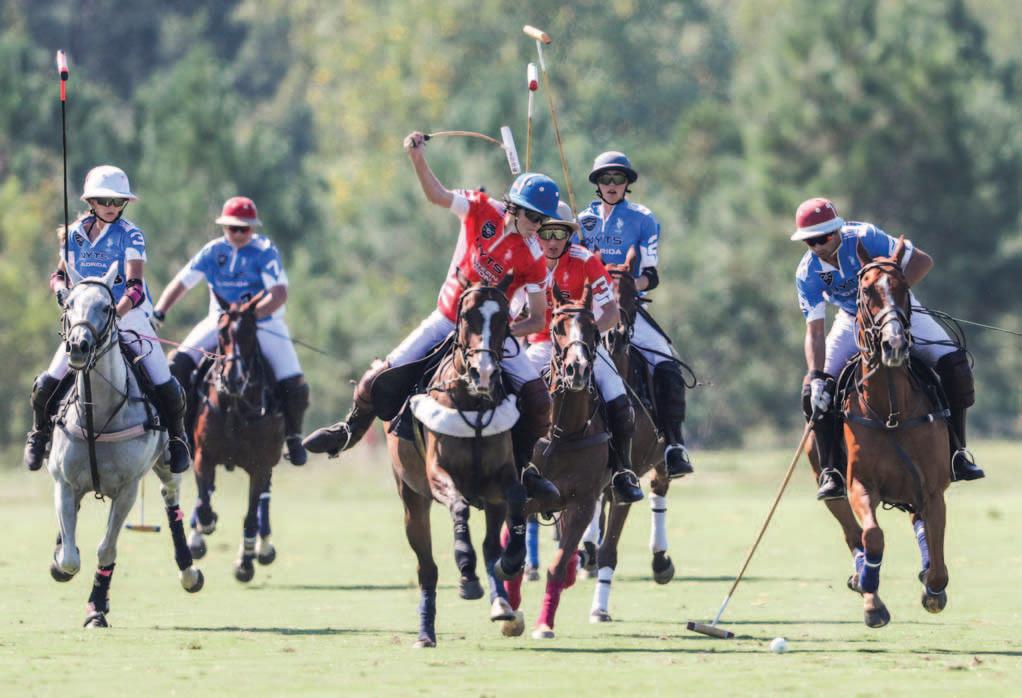

Peke Gonzalez works hard to cover the young Poroto Cambiaso.
Continued from page 47
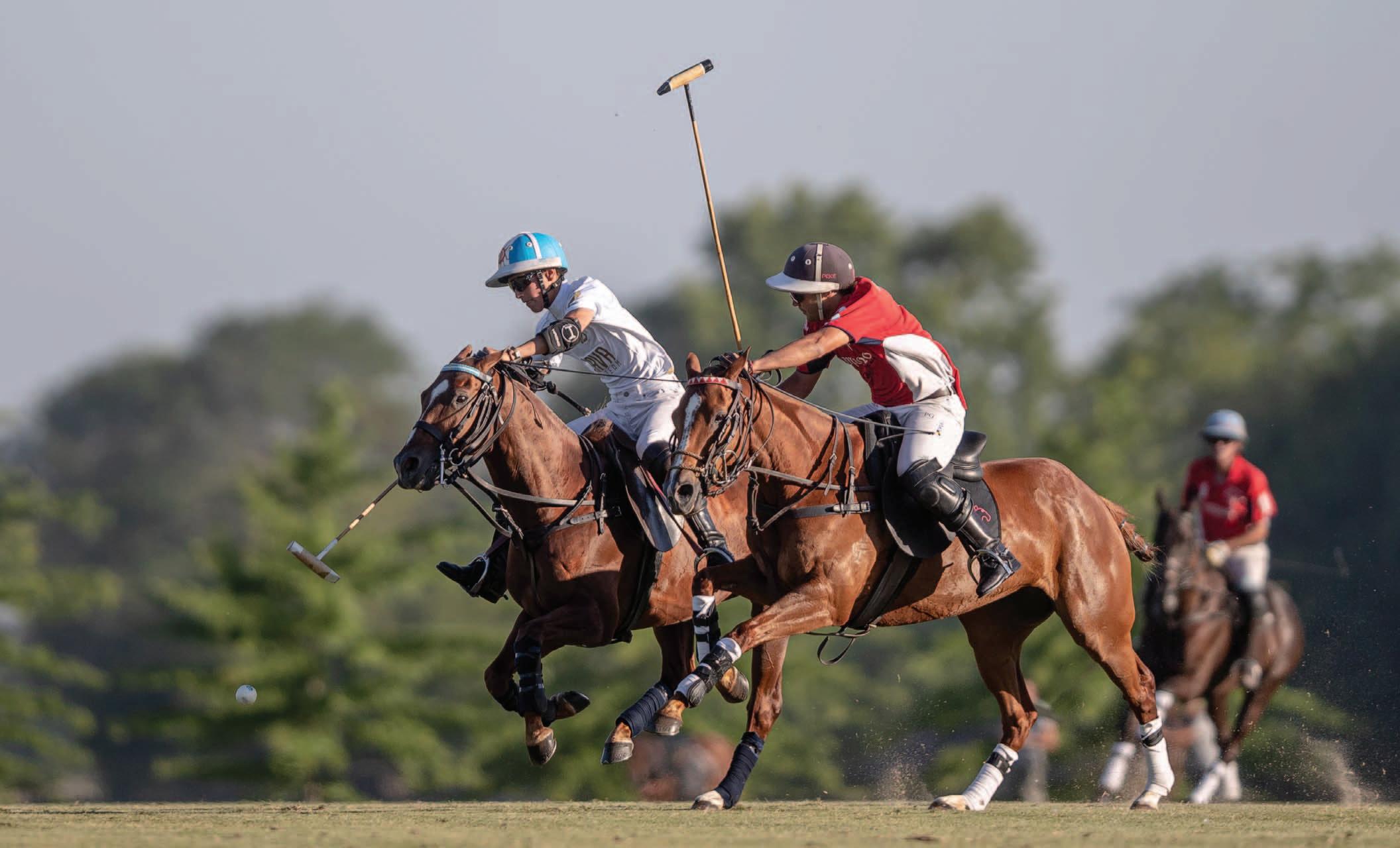
before the Tortugas Open, Poroto had a 4-goal handicap and the AAP moved him two steps without full conviction about his sporting stature at that time. The 6-goal minimum handicap is a regulatory requirement to participate in the series of the three most important competitions and La Dolfina needed the teenager in its roster. His dad wanted him on the pitch immediately. Then, the entity, stimulated by curiosity, the attraction and the good news that would imply the presence of new blood in the high-goal season during a 2020 plagued by bad sports news derived from the coronavirus pandemic, helped make the decision to promote him. That is to say, for the association, which by then had last evaluated Cambiaso a year ago, the player doubled his handicap in 12 months, by raising his valuation from 4 to 8. A case beyond all records.
The challenge now for the Cañuelas club will be to structurally and competitively support La Dolfina, La Dolfina Polo Ranch and La Dolfina Brava in terms of horses and staff. Their breeding and clones are of proven quality at the best level, but supplying 12 polo players in the highest category of demand is not easy even for big organizations. • Copa Cámara de Diputados
Indios Chapaleufú II: Alberto Heguy Jr. 7, Manuel Elizalde 6 (1 goal), Mariano ‘Peke’ González Jr. 6 (3) and Tomas Beresford 6 (3, 2 on penalties). Total: 25.
Umpires: Gastón Lucero and Gonzalo López Vargas. Third man: Federico Martelli.
Play-Off
Cría Geté: Tomás García del Río 7, Cristian ‘Magoo’ Laprida 8 (1 goal), Joaquín Pittaluga 8 and Ignacio ‘Inaki’ Laprida 8 (7, 6 on penalties). Total: 31.
Umpires: Gastón Lucero and Gonzalo López Vargas.
Third man: Matías Baibiene.
Best Playing Pony Polo Argentino: Dolfina Jal-CC- (Open Chimento x Dolfina C06 Lapa Clone ), played by Poroto Cambiaso.










